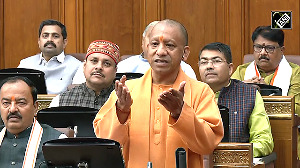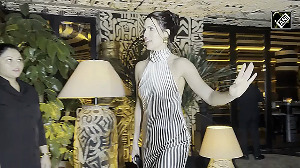Six months ago, Harshad Deo, a software engineer was pleasantly surprised when he went to buy a new refrigerator. On his earlier purchase as a bachelor, he had just picked what he had liked. That the dealer knocked a huge chunk off the price tag on the BPL refrigerator also swung the deal for him.
Now, Deo and wife, who had already decided on an LG or Samsung brand, were suddenly showered with a barrage of questions at their neighbourhood store. Were they non-vegetarians? Was theirs a double income household? What was their budget?
The dealer was only trying to understand and make suggestions on the kind of capacity that the couple would need. That the Deos stuck to their original choice is a different matter altogether. But happy with all the counselling, the couple plan to visit the store more often.
That was at the Plugin Store, the new multibrand white goods outlet promoted by the Vijaypat Singhania-backed Raymond Ltd. A new company, Plugin Sales Ltd, was formed last year with Raymond picking up a 60 per cent stake, with the balance held by a "group of entrepreneurs".
They include Raymond's group president and wholetime director Nabankur Gupta and Plugin's chief executive officer, Nitish Tipnis.
It isn't the only one. Companies like Forbes Gokak and Hero Group to Godrej Industries and the Adani group to Electrolux, they have all embarked on the retail march. Even Reliance Industries will leverage its gasoline station properties to reach out to a larger audience.
Or look at the existing players. Come November, and the Tata group's Trent Ltd will finally make its long awaited debut into food retailing. Its first food store will unfurl in Ahmedabad.
The K Raheja group (which already owns Shopper's Stop) is readying to eat the food pie early next year. Says S Raghunandhan, chief executive officer (CEO) of the Raheja venture, "With the organised segment being so small, the potential for new players is mindboggling."
Industry experts say, that even cigarette manufacturer ITC is considering yet another retail foray, this time into foods. This is to follow up its apparel business of Wills Lifestyle stores launched nationally in 2000. And even as Indo Rama Synthetics has deferred its retail plans for the time being, it is still open to acquisitions, say consultants.
Or Eureka Forbes is finally stepping out of its direct sales cocoon with its Home Stores stocking a range of multi-brand white and brown goods.
Almost every big corporate wants a pie of the booming Rs 800,000 crore (Rs 8,000 billion) retail market, where the organised sector is a measly two per cent. So while those with surplus real estate are licking their chops with retail fantasies, others are giving the final touches to their diversification blueprint for both turnkey projects and acquisitions.
Says Rucheera Gumber, senior consultant, retail at consulting firm KSA-Technopak, "Indian corporates' entry into retailing can be looked at in two ways --forward integration into selling to the consumer and a high growth potential diversification."
Adds Milind Vaidya, senior vice president of direct sales company Eureka Forbes, "Organised retail is the future the world over." He is also the CEO of the company's recent retail venture -- Eureka Forbes Home Store.
The categories much in demand are apparel, food and durables. And the formats? Name it and they are up for grabs. Convenience stores, supermarkets, hypermarkets, value for money formats, mass merchandisers and speciality stores are all the options under the microscope.
In India, only two per cent of fast moving consumer goods' retail turnover comes from large format stores, compared to the global average of 50 per cent.
Also, according to KSA-Technopak's Gumber, the country's retail has been focusing on the top 23 cities. While the top ten cities accounted for 94 per cent of retail sales two years ago, with the top six cities filling the shopping basket with 82 per cent sales, the scene is fast changing. "Organised retail is now percolating to smaller cities," she says.
That's why companies are swooping down on anything that spells acquisitions.
A couple of months ago, when the Andhra Pradesh-based grocery chain Trinethra was wooing investors, two of its suitors included Mumbai-based soaps major Godrej Industries and the country's largest dedicated polyester player, the Rs 2,200-crore (Rs 22 billion) Indo Rama group. Both the companies today claim that although retail is a potential business for them, they will strike when opportunities arise.
Or when Ahmedabad-based detergent and soap maker, Nirma Ltd wanted to exit the retail arena, its Radhe outlet was lapped up by, who else but the Rs 11,000-crore (Rs 110 billion) Adani group of Gujarat. It created a new company for retail -- B2C Ltd in 2000 to set up the Adani hypermarket and supermarket chain.
With 25 stores already operational in its home turf, it plans to move to neighbouring states next fiscal. These include Rajasthan, Madhya Pradesh and Maharashtra. It plans to add another 20 stores across the state this fiscal.
According to Vahid Ravji, chief operating officer of B2C Ltd, the retail market in Gujarat alone is worth between Rs 4,500 crore (Rs 45 billion) to Rs 6,000 crore (Rs 60 billion). "By doing business of even Rs 200 crore (Rs 2 billion), we are just scratching the top layer of this huge market," he says.
So ambitious is the group, that it is targeting a turnover of Rs 120 crore (Rs 1.20 billion) for the current fiscal and Rs 1,200 crore (Rs 12 billion) by the next four years, up from Rs 35 crore (Rs 350 million) in 2003-04. By then, its total investments will be up from Rs 16 crore (Rs 160 million) to Rs 40 crore (Rs 400 million).
For other companies, mainly those in textiles, the retail opportunity is one way to beat the dismantling of the quota systems once the World Trade Organisation treaty comes into effect this fiscal end.
Take the yarn-to-engineering company Forbes Gokak, from the house of Shapoorji Pallonji. Of its Rs 408.5 crore (Rs 4.085 billion) turnover, its yarn business accounts for almost Rs 300 crore (Rs 3 billion).
To climb up the value ladder and hedge its risks, it recently set up the Forbes apparel division for readymade garments.
After a 237-year existence, why is Forbes trying to don new clothes? Says K C Mehra, vice chairman and managing director Forbes Gokak, "One of the strong triggers was the WTO. You have to do this or you will be left behind. The WTO presents a great threat but also an opportunity at the same time."
That's why Forbes upmarket brands division has taken on the marketing onus for well known international brands including Daks, Saville Row, Armani, Burberry's and Ralph Lauren. The brands will retail at stand alone as well as upmarket retail venues.
At the same time, it hopes to change its vendor status (it supplies knitted garments to some public sector oil companies and other readymade brands) to being a marketer by launching its eponymous brand.
Very soon, the company hopes its Forbes brand will jostle for shelf space in over 50 multibrand garment stores. Going by the response, stand alone stores are also being planned. Mehra says, that this will see the division's topline go up from Rs 23 crore (Rs 230 million) to Rs 60 crore (Rs 600 million).
Or look at why Raymond's is plugging into durables. "Organised retail in India has happened only in apparel. But now, the buying behaviour of a consumer is to compare, watch, feel and see. And durables is a service industry with great potential," says Plugin chairman Nabankur Gupta. Adds Nitish Tipnis, the store's CEO, "That's where the money is."
They should know. Gupta, a durables veteran, has had a long innings with both Videocon and Philips before Raymond's. Tipnis was with Videocon, Goodlass Nerolac and Real Value.
With Plugin pitched as a neighbourhood store rather than a destination store, Tipnis is now aiming for a national footprint. From the current 25 stores in Maharashtra (mainly in Mumbai), he wants to plug 50 outlets by this year-end and target 100 in the next four years.
But what does Raymond bring to the table? "It is a pedigreed partner and brings legal, franchisee and back-end expertise. We are the guys who know the business," he adds.
Now cut across to the Rs 510 crore (Rs 5.10 billion) Eureka Forbes which markets its vacuum cleaner and Aquaguard water purifier.
Last December, it launched its Home Store stocking a range of multi-brand consumer durable items. From the current five stores, it plans to have 31 stores in the next two years and gallop to 106 outlets in 41 cities in the next five years.
Just why is the direct sales major inviting consumers to its outlets now? Milind Vaidya, who also doubles up as the store's CEO, claims that the objective is tow-fold. "We are in the business of going to a consumer's doorstep. With our store, we create a platform to serve customers at our doorstep. This way, we can also leverage the status of our door-to-door sale staff's canvassing ability to bring consumers to our shop," he says.
Direct marketing sales currently account for 70 per cent of its turnover.
Just when, everybody is looking at multibrand durable stores, global white goods major Electrolux set up its stand alone stores -- Electrolux Homes six months ago. Electrolux, which has a 40 per cent stake in Eureka Forbes, launched its refrigerators a little over a year ago in multibrand outlets. With increasing competition, it plans to have a panoply of products like washing machines, air conditioners, microwaves and built-in products.
Says Ajay Kapila, vice president, sales and marketing at Electrolux India, "Today, the consumer chooses the places he needs to be seen buying products. For us, the stores are to give them a differentiated brand experience in an environment which is close to the brand identity. We are also doing it to showcase some of our high end products."
With eight franchised stores currently, mainly in the north, it plans to have 25 by this year end.
Today, Electrolux's revenue from its retail outlets is a mere two per cent. Kapila is confident that it will go up to 15 per cent in the next three years.
A service retail venture, is what Rahul Munjal, CEO of Hero group's Easy Bill, a convenience oriented outfit is talking about. Even as there are plans to set up a chain of 7-11 stores, Munjal says, "In our business model, the retailer is our point of contact with the customer and thus plays an integral role. We are looking at partnering with independent stores like general, food stores, chemists and communication centres who provide the reach we want to get to our customers."
The K Raheja group, largely into construction, is looking at both supermarkets and hypermarkets. "The larger size makes more economic sense. And being a low margin, high volume business, it lends itself to entrepreneurs," says Raghunandhan.
Sure. But the gestation period in the business is long. Even established player like Trent and Shopper's Stop claim that it takes well over four to six years to break even. That's where the deep pockets come in. Currently, all the players are financially well off and consultants say, that the only differentiator now will be the quality of service and products.
As Forbes Gokak's Mehra puts it, "Quality is like a 100metre race. Everytime you breast the tape, it goes back 10 metres."
Additional reporting: Meghdoot Sharon






 © 2025
© 2025